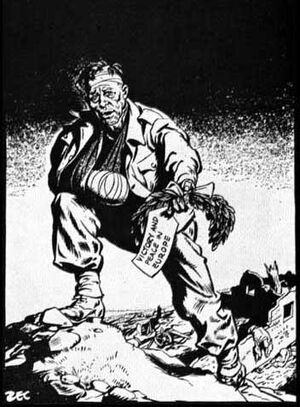
"Here you are. Don't lose it again!", Daily Mirror, VE-Day, 1945
Philip Zec was born Philip Zacanovsky in London on 25 December 1909, the son of Simon Zecanovskya and his wife Leah Oistrakh, a Russian Jewish couple who had fled Tsarist Russia. He was awarded a scholarship from Stanhope Street elementary school to St. Martin's School of Art, where he excelled at portraiture and illustration. At nineteen he set up his own commercial art studio, working for advertising agencies, and became one of the leading illustrators of the time.
In the late 1930s he did some work for the Daily Mirror, helping to devise American-style comic strips, including Steve Dowling's Belinda Blue-Eyes. In 1937 Basil Nicholson, who had been appointed features editor of the Daily Mirror with a brief to transform the paper into a radical left-wing tabloid, hired Zec as a political cartoonist. After war broke out, Zec attacked Hitler, Goering and other leading Nazis in hard-hitting cartoons, and gained a reputation as "the people's cartoonist". That reputation was damaged when he drew a cartoon of a torpedoed sailor clinging to wreckage with the caption "The price of petrol has been increased by one penny; official". It was intended to highlight how necessities like petrol depended on the sacrifice of merchant seamen's lives and shouldn't be wasted, but the government interpreted it as accusing the petrol companies of profiteering. The Home Secretary, Herbert Morrison, threatened to close the paper down if there were any repeat.
His VE-Day cartoon, showing a wounded soldier handing over a laurel labelled "Victory and peace in Europe", saying "Here you are. Don't lose it again!", was rather better received. When Morrison asked him to help with publicity for the Labour Party's general election campaign, Zec reminded him he had previously called him a traitor, and demanded, and got, an apology. His VE-Day cartoon was reprinted on the front page of the Mirror on election day, and some analysts saw it as a factor in Labour's landslide victory.
After the war he became a director of the Mirror and head of its strip cartoon department, where he hired, among others, Reg Smythe. He also edited the Sunday Pictorial from 1950 to '52. He left the Mirror Group in 1958, becoming political cartoonist for the Daily Herald until 1961. He was a director of the Jewish Chronicle for 25 years, and also edited New Europe.
Blind for the last three years of his life, he died in Middlesex Hospital, London, on 14 July 1983, survived by his wife Betty, née Levy, whom he married in 1939. They had no children.
References[]
- Donald Zec, "Zec, Philip (1909–1983)", rev. Oxford Dictionary of National Biography, Oxford University Press, 2004, accessed 18 May 2014
- Biography at British Cartoon Archive